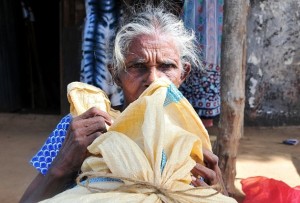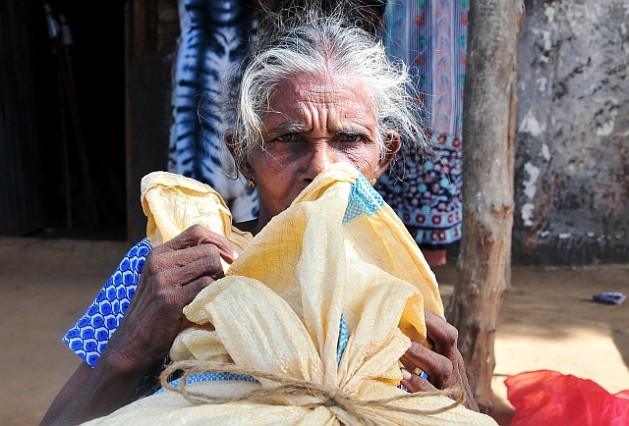 |
Tisaranee Gunasekara
“A structure built on human callousness will inevitably collapse in on itself”.
Avraham Burg (IHT – 6.9.2003)
First they came for the pavement-traders.
Pavement-trading is not a bar to development. On the contrary; pavement-trading provides the enterprising poor with an affordable means of commercial upward-mobility. Many a rags-to-riches tale, globally and nationally, began on the pavement. And for many Lankans, pavement-stalls were a source of cheaper goods. The minor inconveniences caused by pavement-stalls could have been resolved without wiping-out the phenomenon and depriving hundreds of thousands of people of a livelihood.
The UNP of Ranasinghe Premadasa or JR Jayewardene would have fought unconditionally to protect this anti-Rajapaksa Colombo. Unfortunately neither Ranil Wickremesinghe nor Sajith Premadasa seems greatly interested in the matter. Ranil Wickremesinghe’s main enemy is Sajith Premadasa and Sajith Premadasa’s main enemy is Ranil Wickremesinghe.
But absolutism is the Rajapaksa Way.
Next they came for the urban poor.
Urban poor is not synonymous with unauthorised dwellers. Many are/were legal owners of their little houses, long-time residents-taxpayers-voters. But they had to be demonised as ‘illegals’ in order to minimise societal outrage at military-style operations which dragged out men, women and children and bulldozed their homes into rubble.
Then came the turn of small traders.
In Bastian Mawatha, Pettah, the shops were neither unauthorised nor temporary; they were permanent structures, built and leased by the state, but that was no bar to the Rajapaksas’ land-grabbing operation. Once again the army and the police descended on the stalls, with the briefest of warning; they came early morning, averting any live-media coverage of this latest ‘humanitarian operation’.1
The process of dispossessing will not end there. Nor will it be confined to urban centres. It has happened to fishermen of Kalpitiya. Not even Sinhala-Buddhist peasantry, the supposed bedrock of Rajapaksa power, is being spared. In Ampara, the Navy forcibly occupied the villages of Ragamwela2, Ulpassa and Egodayaya; these lands are reportedly being used to build hotels3 and a Presidential holiday resort. The proposed construction of sea plane landing-sites in four ancient tanks in Polonnaruwa will devastate the livelihoods of several farming and fishing communities.
The attempt to introduce the Sacred Areas Act demonstrates that the Rajapaksa land-hunger will not be appeased by dispossessing the urban/rural poor. Enlightened self-interest, apart from moral or humanitarian considerations, demand that middle-classes join the poor in resisting these anti-popular measures, before they too are victimised by the Siblings’ acquisitive policies.
When the Rajapaksas, under cover of anti-terrorism, sought to deport North-Eastern Tamils from Colombo, the pavement traders would not have thought that the same fate would befall them a few years later. When pavement-stalls were wiped out, small traders would not have thought that their turn would come next. When Tamils and urban poor were dispossessed, the Sinhala villagers of Ampara would not have thought the same fate would befall them.
In today’s Sri Lanka, in order to be unsafe and insecure, to lose a home or a job, one does not have to be a Tamil/Muslim or a Rajapaksa-opponent.
The Rajapaksa vision of development is akin to the Rajapaksa vision of nation-building – compulsive rather than consensual, structurally unequal and profoundly anti-humanitarian. The ethno-religious populism of the Rajapaksas is a cover for their anti-popular economics, a ruse to reconcile the Sinhalese to their worsening economic plight.
The Siblings have been uncommonly successful in hiding this unpalatable and frightening reality. By isolating each target, they have managed to prevent us from forming a holistic view of the threat posed by Familial Rule. Words are distorted to obfuscate reality and ethno-religious and class prejudices are used to preclude even human sympathy. Just as Tamils were equated with Tigers and Muslims are equated with Al Qaeda, the urban poor are being depicted as unclean and undesirable, an obstruction to flood-control and disease prevention and a danger to law and order. It is being implied that Colombo cannot become a modern metropolis with clean air, unblocked drains and safe streets while the poor are here. The aim is to blunt our capacity for compassion by playing on our phobias, to persuade us to see the victims of the Rajapaksas’ development war not as fellow human beings but as ‘threats’ and ‘obstructions’.
Rajapaksa governance is tyrannical, predatory and pitiless. Rajapaksa politics objectifies people, either to be used as weapons, discarded as marginals or suppressed as obstacles. Rajapaksa economics is as family-centric as Rajapaksa politics, and irrational, sometimes to the point of insanity. Mattala airport reinforces the lesson of the Ruhunu-Magampura Mahinda Rajapaksa Port: familial interests/whim/fancies will always triumph over economic rationality and national-popular needs. To sustain their development strategy, the Rajapaksas need a cowed society, a subservient judiciary and a week opposition, repressive laws and a labour force poor enough and desperate enough to work for phenomenally low wages, under abysmal working conditions.
Rajapaksa economics will have a ruinous impact not just on the poor but also on the middle classes. Already the middles classes are being compelled to shoulder a disproportionate share of the burden via increased inflation. The prioritising of defence spending will leave less and less money for those subsidies and services which the middle classes need in order to maintain their economic standards and social status.
With their humanitarian operation, the Rajapaksas increased the psychological divide between the North and the South. With their economic policies, they will exacerbate the class-divide. The Rajapaksas understand the danger of a unified opposition. The last thing they want is a broad, ethno-religious, class-caste coalition. They want to fragment Lankans, to prevent any solidarity, cooperation and even sympathy, across ethnic/religious/class barriers.
Thus their use of proxies, such as the Bodu Bala Sena, to nurse the fires of racism. That way, the victims of Rajapaksa rule can be hoodwinked into to seeking refuge in their parochial identities, as Sinhalese/Tamils/Muslims or Buddhists/Hindus/Christians/Muslims.
And to rise up against each other, rather than against their common oppressor.
Their Colombo Plan
The city of Colombo is a hub of pluralism, a place where people of every ethnicity, religion, class and caste live cheek by jowl. It is this heterodoxy which gives Colombo its socio-cultural character and political complexion. This rich diversity would be alien to the Rajapaksas of Medamulana, used to lording it over poor Sinhala villagers.
It is also a political-threat; the Rajapaksas cannot occupy Colombo electorally without transforming it demographically. Not only are Colombo’s poor pro-UNP; they are also ethno-religiously pluralist, culturally heterodox and, in their boisterous irreverence, immune to our Ruling poseurs.
And it is they who have kept Colombo a Rajapaksa free-city, far.
In the Rajapakse-worldview, Colombo’s poor are not just alien, socially, sociologically and ethno-religiously; they are also dangerous, politico-electorally.
This Colombo is the natural home of anti-Rajapaksa politics.
The UNP of Ranasinghe Premadasa or JR Jayewardene would have fought unconditionally to protect this anti-Rajapaksa Colombo. Unfortunately neither Ranil Wickremesinghe nor Sajith Premadasa seems greatly interested in the matter. Ranil Wickremesinghe’s main enemy is Sajith Premadasa and Sajith Premadasa’s main enemy is Ranil Wickremesinghe. Neither prioritises the necessary struggle against the Rajapaksas. Both seem reluctant to seriously antagonise the Rajapaksas. Each seems to regard the Siblings as a tactical ally against the other.
Both are allowing the Rajapaksas to win the battle for Colombo, by default.
If the Rajapaksa’s Colombo Plan succeeds, it will have a devastating effect not only on the waning political fortunes of the UNP but also on the chances of mounting a successful fight-back against familial rule, someday.
1 http://www.dailymirror.lk/caption-story/25331-pettah-vendors-plead-as-shops-destroyed.html
2 On the night of 17th July, 2010, an armed gang set fire to Ragamwela. According to Panama Mudiyanselage Bandara, a resident of Ragamwela, “They took us out and threatened to kill us. They had two T 56 rifles. I managed to flee but by the time I turned back they were setting fire to everywhere” (BBC – 18.7.2010). When some of the villagers ran to the nearby STF post for help and protection, the STF personnel refused to intervene. The police prevented the inhabitants from returning to their burnt-village and the Chief Sanganayake of Wellassa-Digamadulla was barred from observing ‘vas’ in the village temple.
3 The Navy reportedly destroyed an ancient archaeological site, the Samudragiri Temple in Ragamwela.
